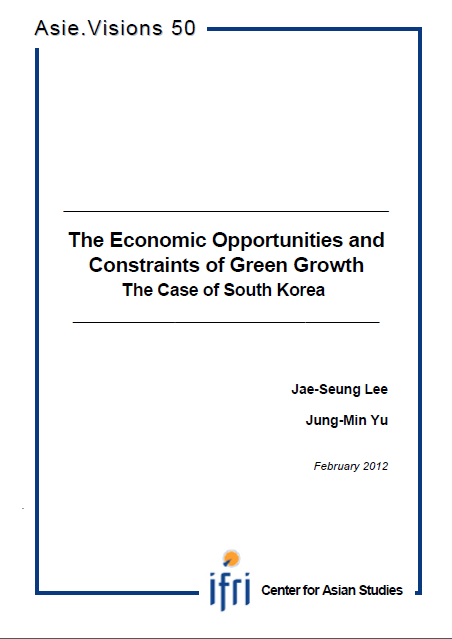The Economic Opportunities and Constraints of Green Growth: The Case of South Korea

To this end, 15 green technologies were chosen as priorities for governmental support. A number of green growth policies, such as the emission trading system, the Green Homes Project and the Renewable Portfolio Standard, are expected to provide a stable framework for domestic market expansion. In addition, the government R&D investment plan is expected to play an important role in filling a technological gap between South Korea and leading countries in green energy.
The nation's well-developed industrial foundation in areas such as technology and infrastructure will be an advantage that can be easily applied to the green energy industry. Furthermore, the nation's advanced IT and electronic technology firms have entered the smart-grid business.
Based on strong political support and policy measures, South Korea's green growth policy has showed noticeable progress in a short period of time. However, the biggest challenges are technological dependency and growing competition in the global market. Also, the transition from a hydrocarbon-based economy to a renewable-based one could bear a huge economic and social cost. The speed of the transition, as well as a series of external variables - such as the global economic condition - will also affect the progress of green growth in South Korea.

Available in:
Regions and themes
ISBN / ISSN
Share
Download the full analysis
This page contains only a summary of our work. If you would like to have access to all the information from our research on the subject, you can download the full version in PDF format.
The Economic Opportunities and Constraints of Green Growth: The Case of South Korea
Related centers and programs
Discover our other research centers and programsFind out more
Discover all our analysesThe U.S. Policy Toward Taiwan Beyond Donald Trump: Mapping the American Stakeholders of U.S.-Taiwan Relations
Donald Trump’s return to the White House reintroduced acute uncertainty into the security commitment of the United States (U.S.) to Taiwan. Unlike President Joe Biden, who repeatedly stated the determination to defend Taiwan, President Trump refrains from commenting on the hypothetical U.S. response in the context of a cross-Strait crisis.

China’s Strategy Toward Pacific Island countries: Countering Taiwan and Western Influence
Over the past decade, China has deployed a diplomatic strategy toward the Pacific Island Countries (PICs). This strategy pursues two main objectives: countering Taiwan's diplomatic influence in the region and countering the influence of liberal democracies in what Beijing refers to as the "Global South."

Opening up the G7 to South Korea to Address Contemporary Global Challenges
The G7’s global influence has diminished as powers like China reshape international governance through initiatives such as BRICS and the Shanghai Cooperation Organisation (SCO). With the G7 now representing just 10 per cent of the world’s population and 28 per cent of global GDP, its relevance is increasingly questioned.
Expanding SPDMM as a pivotal institution in the Pacific – A French perspective
The South Pacific Defence Ministers’ Meeting (SPDMM) is the only forum that brings together defense ministers from the wider South Pacific — including Chile, which is hosting it for the first time. This heterogeneous group of countries with varying resources, capacities, and interests — Australia, Chile, Fiji, France, New Zealand, Papua New Guinea (PNG), and Tonga — are united by their shared determination to strengthen cooperation on maritime security and humanitarian assistance and disaster relief (HADR) activities.







